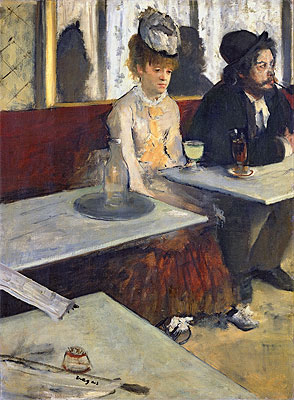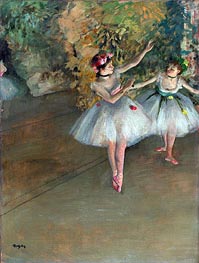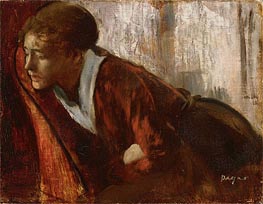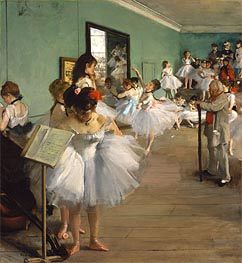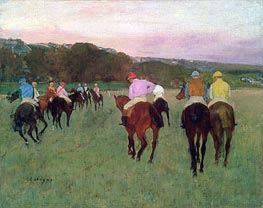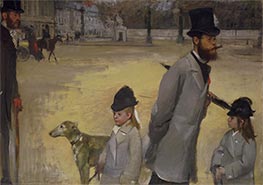The Absinthe Drinker (In a Cafe), c.1875/76 by Hilaire Germain Edgar Degas
Canvas Print - 2804-DEE
Location: Musee d'Orsay, Paris, FranceOriginal Size: 92 x 68 cm
Giclée Canvas Print | $55.2 USD
Your Selection
Customize Your Print
By using the red up or down arrows, you have the option to proportionally increase or decrease the printed area in inches as per your preference.
*Max printing size: 24 x 17.6 in
*Max framing size: Long side up to 28"
"The Absinthe Drinker (In a Cafe)" will be custom-printed for your order using the latest giclée printing technology. This technique ensures that the Canvas Print captures an exceptional level of detail, showcasing vibrant and vivid colors with remarkable clarity.
Our use of the finest quality, fine-textured canvas lends art reproductions a painting-like appearance. Combined with a satin-gloss coating, it delivers exceptional print outcomes, showcasing vivid colors, intricate details, deep blacks, and impeccable contrasts. The canvas structure is also highly compatible with canvas stretching frames, further enhancing its versatility.
To ensure proper stretching of the artwork on the stretcher-bar, we add additional blank borders around the printed area on all sides.
Our printing process utilizes cutting-edge technology and employs the Giclée printmaking method, ensuring exceptional quality. The colors undergo independent verification, guaranteeing a lifespan of over 100 years.
Please note that there are postal restrictions limiting the size of framed prints to a maximum of 28 inches along the longest side of the painting. If you desire a larger art print, we recommend utilizing the services of your local framing studio.
*It is important to mention that the framing option is unavailable for certain paintings, such as those with oval or round shapes.
If you select a frameless art print of "The Absinthe Drinker (In a Cafe)" by Edgar Degas, it will be prepared for shipment within 48 hours. However, if you prefer a framed artwork, the printing and framing process will typically require approximately 7-8 days before it is ready to be shipped.
We provide complimentary delivery for up to two unframed (rolled-up) art prints in a single order. Our standard delivery is free and typically takes 10-14 working days to arrive.
For faster shipping, we also offer express DHL shipping, which usually takes 2-4 working days. The cost of express shipping is determined by the weight and volume of the shipment, as well as the delivery destination.
Once you have added the paintings to your shopping cart, you can use the "Shipping estimates" tool to obtain information about available transport services and their respective prices.
All unframed art prints are delivered rolled up in secure postal tubes, ensuring their protection during transportation. Framed art prints, on the other hand, are shipped in cardboard packaging with additional corner protectors for added safety.
Painting Information
The scene presents two figures seated in a quiet cafe, each absorbed in a pensive, almost forlorn state. The woman, dressed in a pale ensemble with a soft, layered bodice and a structured hat, sits closest to us. Her gaze drifts downward, and her features appear drawn, as if weighed by private thoughts. Beside her, the man wears a dark coat and matching hat, his posture slouched and his attention equally distant. On the tabletop, a glass of absinthe and another of deeper color sit as silent witnesses, while the bottle on the adjacent tray suggests an ongoing moment of disconcerting stillness. Shadows in the mirrored background accentuate the starkness of the setting, reminding the viewer of an enclosed, urban environment dedicated to fleeting pleasures.
A subdued palette dominates the painting, mostly cool grays, muted browns, and touches of ochre. These tones imbue the scene with a palpable heaviness, as though the figures are submerged in a haze mirroring the potency of the liquor. Hints of white - from the woman’s attire and the tabletop - offer brief respites of clarity, yet they scarcely relieve the underlying mood of isolation. The careful gradations of color allow the artist to capture the air of detachment with sobering realism, an effect heightened by the subtly textured brushstrokes around the figures’ faces.
Such attention to technique underscores a precise but somewhat dispassionate approach. While the overall painting might evoke a spontaneous observation, records show it was executed in a studio rather than in the actual cafe. This studied preparation is most evident in the balanced distribution of shapes and forms: the trio of tables receding at angles, the truncated hand of the man in the foreground, and the reflections in the mirror behind. The off-center framing - inspired by Japanese prints - introduces a feeling of precariousness, as though the viewer’s vantage point is merely a brief intersection with the figures’ ongoing melancholy.
In the broader context, such an urban tableau reflects the gathering places of a flourishing bohemian society of the late 19th century, yet the artist’s lens is focused on the fragility underlying those gatherings. The sense of alienation resonates with contemporary literary works, especially considering parallels drawn with novels exploring the destructive lure of absinthe. While the scene appears candid, it is artfully structured to underscore the distance between the seated man and woman, as well as the distance separating them from the viewer. This tension between surface spontaneity and calculated design typifies the artist’s command of both subject and technique, leaving the unmistakable impression of a reflective, almost documentary realism.
